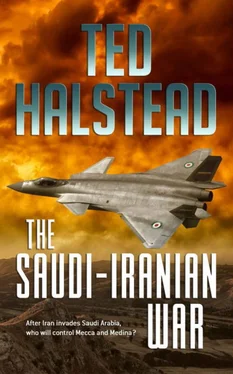Ted Halstead - The Saudi-Iranian War
Здесь есть возможность читать онлайн «Ted Halstead - The Saudi-Iranian War» весь текст электронной книги совершенно бесплатно (целиком полную версию без сокращений). В некоторых случаях можно слушать аудио, скачать через торрент в формате fb2 и присутствует краткое содержание. Год выпуска: 2019, Издательство: Independently published, Жанр: Боевая фантастика, Триллер, на английском языке. Описание произведения, (предисловие) а так же отзывы посетителей доступны на портале библиотеки ЛибКат.
- Название:The Saudi-Iranian War
- Автор:
- Издательство:Independently published
- Жанр:
- Год:2019
- ISBN:нет данных
- Рейтинг книги:4 / 5. Голосов: 1
-
Избранное:Добавить в избранное
- Отзывы:
-
Ваша оценка:
- 80
- 1
- 2
- 3
- 4
- 5
The Saudi-Iranian War: краткое содержание, описание и аннотация
Предлагаем к чтению аннотацию, описание, краткое содержание или предисловие (зависит от того, что написал сам автор книги «The Saudi-Iranian War»). Если вы не нашли необходимую информацию о книге — напишите в комментариях, мы постараемся отыскать её.
The Saudi-Iranian War — читать онлайн бесплатно полную книгу (весь текст) целиком
Ниже представлен текст книги, разбитый по страницам. Система сохранения места последней прочитанной страницы, позволяет с удобством читать онлайн бесплатно книгу «The Saudi-Iranian War», без необходимости каждый раз заново искать на чём Вы остановились. Поставьте закладку, и сможете в любой момент перейти на страницу, на которой закончили чтение.
Интервал:
Закладка:
That particular Refliks anti-tank missile ended Jamal Al-Qahtani’s dreams of promotion, as it punched through the front armor of his M1A2 tank.
Fortunately, besides the R-330ZH Hamid had brought another tracked electronic warfare vehicle, the smaller 1L262E RTUT-BM. Though its main purpose was to defeat radar-guided warheads, its operator had assured him that it could also jam enemy communications, though over a shorter distance than the R-330ZH.
The commander of the remaining Saudi tanks finally did what Hamid imagined he would have done even earlier. He retreated.
Hamid let the pitiful handful of Saudi tanks and APCs remaining escape, while he collected survivors from the few tanks the Saudis had been able to damage. Even a task as delightful as destroying Saudi tanks had to take second place to his primary objective- leveling as many palaces and government buildings in Riyadh as possible.
There was no doubt that the Saudis had hundreds of M1A2 tanks on their way back from Yemen that could turn up any moment. Hamid knew that even if many of his tanks were better, they couldn’t overcome a force twice their size, or even more.
No, there was no substitute for speed. Now that he had brushed this obstacle out of his way, nothing was going to stop Hamid from making it to Riyadh.
Chapter Thirty
President Hernandez looked up as Chief of Staff Chuck Soltis came hurrying into the Oval Office. He thought he’d seen every expression possible on Soltis’ face, but not this odd combination of excitement, worry, and near panic. At the same moment, he noticed a red light flashing on his phone that told him of an incoming call. Since he had none scheduled, he assumed that’s why Soltis was here.
He was right. Soltis stood in front of his desk for a moment, clearly out of breath, and then forced out, “Sir, the new Iranian Supreme Leader is on the phone, and says he wants our help in getting their invasion force to surrender.”
Hernandez leaned back in his chair, and gestured for Soltis to sit down, which he did gratefully.
“OK,” Hernandez said, “new Iranian Supreme Leader. Do we know that really is whoever’s on the other end of the phone?”
“We think so, sir,” Soltis replied. “We got a call first from the Iranian Ambassador to the UN in New York, who introduced him and said that he had been elected Supreme Leader by the Assembly of Experts after the old Supreme Leader died. His name is…,” and then after a look at the notes in his hand, “Grand Ayatollah Sayyid Vahid Turani.” He then handed the notes to Hernandez.
“Interesting. Wasn’t the previous Supreme Leader in a coma for months? Quite a coincidence that he happened to die just now, isn’t it?”
“Yes, sir,” Soltis replied, nodding. “You’ll see in my notes that within the past hour the CIA received an unconfirmed report that he was assassinated by the Pasdaran.”
Hernandez shook his head. “Pasdaran. Also known as the Revolutionary Guards? Isn’t this exactly the sort of thing they were supposed to guard against?”
Soltis shrugged. “Yes, sir, but as you know our understanding of what’s happening in Iran has always been limited. No US Embassy in Tehran since 1979, any American who visits risks being arrested on any pretext and effectively becoming a government hostage… getting good information about Iran has been a challenge for a long time.”
Hernandez grunted. “And now the new Supreme Leader wants to help get the Iranians just outside Riyadh to surrender. Now, this isn’t the same fellow who’s been acting as Supreme Leader over the past months, right? I don’t remember his name, but I’m pretty sure it wasn’t…” Hernandez paused as he looked over Soltis’ notes. “Turani,” he finished.
“No, sir,” Soltis said. “If you look a bit further down the notes, there’s another unconfirmed report that the Ayatollah who had been acting Supreme Leader, Reza Fagheh, has been executed.”
“Right,” Hernandez said slowly, as he read further down the page of notes.
Soltis added, “Fred Popel is on his way here from State and I’m sure he could do a better job of explaining all this, but since this Turani fellow says he can stop the invasion, I thought you’d want to talk to him right away.”
Hernandez nodded, and said, “Chuck, remind me about how they handle politics in Iran the next time I complain about having to negotiate with Congress.”
“Yes, sir,” Chuck said, smiling. General Robinson, the Air Force Chief of Staff, then walked in and Soltis added, “I asked the General to join us in case whatever help Turani wants involves the military, sir. He was already in the building for a meeting.”
Hernandez nodded, and waved Robinson to the other chair in front of his desk. “Well, I guess it’s time to see what he wants.”
Hernandez punched the button that put the call on speaker. “This is President Hernandez. Who am I speaking with?”
The voice that responded spoke in careful, accented, but perfectly understandable English. “I am Grand Ayatollah Sayyid Vahid Turani. I have just been elected Supreme Leader of the Islamic Republic of Iran by the Assembly of Experts. I am speaking to you without an interpreter to try to ensure there is no… miscommunication, but have an interpreter here if one is needed.”
Hernandez replied, “I have with me General Robinson, the Air Force Chief of Staff, and the White House Chief of Staff, Chuck Soltis. I understand you would like our help in communicating with your forces outside Riyadh, to persuade them to surrender.”
There was a long pause, followed by, “Yes, that is correct. You should soon receive the text of the message I plan to send to them by radio. It is important that they hear my voice, which I am sure they will recognize.”
Chuck hurried out to see whether any message had been received.
“Are you sure that they will follow your orders?” Hernandez asked. “I understand that you are not the person who sent them on this mission.”
The answer this time was quicker. “It’s true, I am not the one who sent them to attack a fellow Muslim nation. I am also not the one who attacked that same nation with nuclear weapons, and tried to do so with chemical weapons as well. But I think I can get our soldiers outside Riyadh to listen to me.”
Hernandez nodded, and asked, “If you did not do these things, who did?”
Now the answer came instantly, and bitterly. “The criminal who for months had the title of Acting Supreme Leader, Reza Fagheh. He has already been tried, and answered for his crimes.”
“I see,” Hernandez said, as Soltis returned carrying a fax message in his hand. “Just a moment, please,” he said, and pressed the hold button.
“From the Iranian Mission to the UN,” Soltis said. “It’s the text he proposes to read to his troops. It’s pretty chilling stuff, sir.”
Hernandez nodded. “Before I get into that, General, do we have the capability to do what he’s asking, help him relay a radio message to his forces near Riyadh?”
Robinson shrugged and said, “Yes, sir. The Navy has a Triton on station in the Kingdom, and battlefield communication coordination is one of its primary missions. We just need their forces’ command network frequency and any authentication codes they use, and we’ll give them the frequency to use to communicate with the Triton and a one-time authentication code. We can easily boost the signal and make sure it’s heard by any vehicle in the network that has its radio turned on.”
Hernandez said, “Excellent,” and then read through the proposed message.
Frowning, he punched the hold button to continue the call. “We have the technical capability to do what you request. Let’s discuss what you plan to say…”
Читать дальшеИнтервал:
Закладка:
Похожие книги на «The Saudi-Iranian War»
Представляем Вашему вниманию похожие книги на «The Saudi-Iranian War» списком для выбора. Мы отобрали схожую по названию и смыслу литературу в надежде предоставить читателям больше вариантов отыскать новые, интересные, ещё непрочитанные произведения.
Обсуждение, отзывы о книге «The Saudi-Iranian War» и просто собственные мнения читателей. Оставьте ваши комментарии, напишите, что Вы думаете о произведении, его смысле или главных героях. Укажите что конкретно понравилось, а что нет, и почему Вы так считаете.












